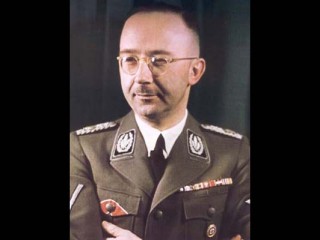
Heinrich Himmler biography
Date of birth : 1900-10-07
Date of death : 1945-05-23
Birthplace : Munich, Germany
Nationality : German
Category : Historian personalities
Last modified : 2010-10-07
Credited as : National Socialist-Nazy, politician, military commander
37 votes so far
The son of a Roman Catholic secondary-school master, Himmler studied agriculture after World War I and joined rightist paramilitary organizations. As a member of one of these, Ernst Röhm's Reichskriegsflagge (“Imperial War Flag”), he participated in November 1923 in Adolf Hitler's abortive Beer Hall Putsch in Munich. Himmler joined the Nazi Party in 1925, rose steadily in the party hierarchy, and was elected a deputy to the Reichstag (the German parliament) in 1930. The foundations of his future importance, however, were laid with his appointment as Reichsführer of the SS (Schutzstaffel; “Protective Echelon”), Hitler's elite bodyguard, which was nominally under the control of the Sturmabteilung (SA; “Assault Division”). Himmler immediately began expanding the SS, which reached a membership of more than 50,000 by 1933. After Hitler gained power on January 30, 1933, Himmler became head of the Munich police and soon afterward became commander of all German police units outside Prussia. As such, he established the Third Reich's first concentration camp, at Dachau.
In April 1934 Himmler was appointed assistant chief of the Gestapo (Secret State Police) in Prussia, and from this position he extended his control over the police forces of the whole Reich, assuming full command of them in 1936. He masterminded the June 30, 1934, purge in which the SS eliminated the SA as a power within the Nazi Party. This purge strengthened Hitler's control over both the party and the German army, which had viewed the SA as a serious rival. Himmler then began to build the SS into the most powerful armed body in Germany next to the armed forces. Under Himmler the SS acquired vast police powers in Germany and the territories it occupied, and it also gained primary responsibilities in the areas of security, intelligence gathering, and espionage.
World War II brought a vast extension of Himmler's empire and the resources at his command. After Germany invaded the Soviet Union in June 1941, Himmler was entrusted with the administration of the conquered territory with the goal of eliminating the Soviet system. He oversaw the deployment of the Einsatzgruppen (“deployment groups”) in the massacre of Jews and other victims at sites such as Baby Yar, in Ukraine, during the early war years. Himmler organized the extermination camps in German-occupied Poland at which millions of Jews were systematically slaughtered. The camps also provided workers for cheap forced labour and subjects for involuntary medical experiments.
By 1943 Himmler had become minister of the interior and plenipotentiary for Reich administration. He expanded the Waffen-SS (“Armed SS”) until, with 35 divisions, it rivaled the army. He also gained control of the intelligence network, military armaments (after the abortive attempt on Hitler's life of July 20, 1944), the Volkssturm (“People's Storm Troop”), a mass levy of mostly older men, and later the Werwolf, a guerrilla force intended to continue the struggle after the war. He also unsuccessfully commanded two army groups.
Not content with military power alone, Himmler attempted to set up an autonomous SS industrial empire. When this provoked resistance from Hitler's minister for armaments and war production, Albert Speer, Himmler apparently orchestrated an attempt on the latter's life in February 1944.
In the final months of the war, Himmler suffered increasingly from psychosomatic illnesses and was progressively shunted aside by Hitler's entourage. In April 1945 it became known that Himmler hoped to succeed Hitler and that he had negotiated with both Swedish Greve (Count) Folke Bernadotte (to surrender to the Western allies) and the Western Allies (to form an alliance against the Soviet Union). Hitler promptly stripped Himmler of all offices and ordered his arrest. Disguised as a common soldier, Himmler attempted to escape. Captured by the Western Allies, he committed suicide by taking poison.
Himmler was a highly effective administrator and a ruthless and adroit power seeker who was slavishly devoted to Hitler until the final weeks of the war. He combined a penchant for philosophical mysticism with a cold-blooded, fanatical adherence to Nazi racist ideology in his role as the prime architect of the Holocaust. More than any other individual, Himmler was the man who created the network of state terror by which the Third Reich suppressed its opposition, eliminated its internal enemies, and compelled obedience from the German citizenry.
















